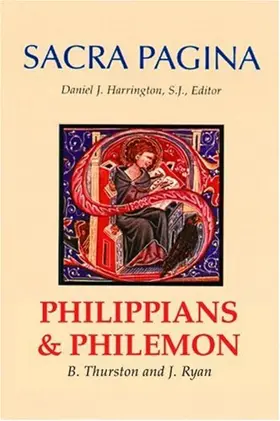

Philippians And Philemon
in Sacra Pagina
Pages
304 pages
Publisher
Liturgical Press
Published
1/1/2003
ISBN-13
9780814658208
Collections
This book appears in the following featured collections.
- Commentaries by Female Scholars by John Dyer
- Commentaries by Roman Catholic Scholars by John Dyer
Reviews
Collegeville, Minn.: Liturgical Press, 2005. Pp. xiv + 290. Hardcover. $39.95. ISBN 0814658202. Jeremy Punt Stellenbosch University Matieland, South Africa 7602 The Sacra Pagina commentary series promises to present “fresh translations and modern expositions” for “biblical professionals, graduate students, theologians, clergy, and religious educators” while attending to “sound critical analysis without any loss of sensitivity to religious meaning.” In volume 10 in this series, Bonnie Thurston wrote on Philippians and Judith Ryan on Philemon, and in general both authors succeeded well in making good on these promises, in a time when there is some suspicion of attempts that claim to achieve scholarly, critical and religious, constructive goals simultaneously. The fairly uncomplicated structure of the book entails a generally brief but lucid discussion of important introductory issues followed by a second, longer section where each author provides her own translation of the Greek text, grammatical and linguistic notes on the text, and an interpretation of the text that includes literary, historical, and social elements, approaches, and methodologies. Whereas Thurston employs a thematic structure for her commentary on the text of Philippians, Ryan uses an epistolary approach for her commentary on Philippians. Bonnie Thurston deals with both the historical and literary backgrounds of Philippians, not claiming to provide any novel perspective but rather to represent important past and current positions (3) from which she then makes informed decisions.
[Full Review]
Bonnie B. Thurston, eine freie Wissenschaftlerin, die momentan als Einsiedlerin in der Nähe von Wheeling/West Virginia, lebt und auch als Autorin poetischer und spiritueller Texte hervorgetreten ist, untergliedert die Einleitung ihres Kommentars zum Brief des Paulus an die Gemeinde von Philippi in zwei Hauptteile, in denen sie historische und literarische Hintergründe des Philipperbriefs diskutiert. Sie stellt knapp die antike Geschichte der Stadt Philippi vor, plädiert dafür, dass es dort zur Zeit des Paulus keine jüdische Gemeinde gegeben habe, und beleuchtet vor allem anhand von Apg 16 die Gründung der dortigen christlichen Gemeinde. Wohl zu Recht hebt die Autorin in diesem Zusammenhang die besondere Qualität der Informationen, die die Apostelgeschichte gerade an dieser Stelle bietet, hervor. Recht ausführlich geht sie auf die Situation der Lydia ein und betont das unkonventionelle Vorgehen des Paulus: „It is a startling picture of Paul the Pharisee breaking all sorts of barriers in carrying the Gospel to the Gentile world, and while this image serves Luke’s purposes, it does not conflict with what Paul’s letters reflect about the Philippian church“ (15). In ihrer Rekonstruktion der Situation der Gemeinde von Philippi betont Thurston die besonders intensive persönliche Beziehung des Paulus zu den Philippern, die diesen auch in verschiedenster Weise unterstützt hätten. Besonders stark hervorzuheben sei die Rolle der Frauen in der Gemeinde von Philippi—Thurston widmet dieser Frage einen eigenen Abschnitt.
[Full Review]
